The Caribbean Academic Forum strengthens the path toward the Regional Conference with transformative reflections and solutions, placing the care society at the center.
Barbados, March 27, 2025 - With a significant participation of representatives from academia, international institutions, civil society organizations, and political stakeholders, the Caribbean Academic Forum: Contributions to the XVI Regional Conference on Women in Latin America and the Caribbean: Moving Towards Caring Societies, was held on March 25 and 26 in Barbados.
Date:
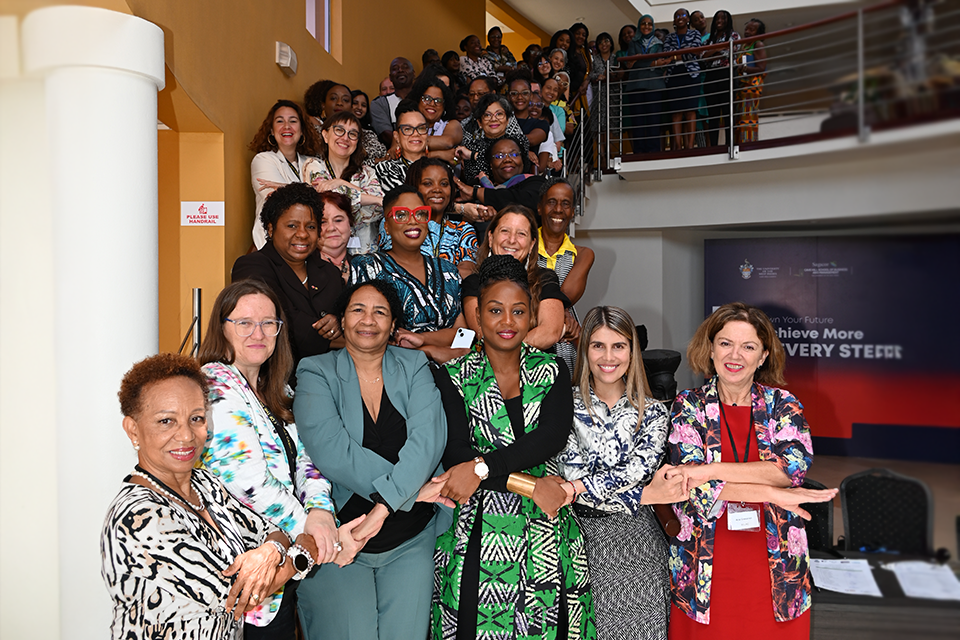
Organized by ECLAC, in conjunction with The Consortium Universities Caribbean, the Institute for Gender and Development Studies of the University of the West Indies, UN Women and the International Development Research Centre of Canada (IDRC-IDRC), and in collaboration with El Colegio de México (COLMEX), the Global Alliance for Care and the United Nations Research Institute for Social Development (UNRISD), the Forum was a milestone in the preparatory process towards the XVI Regional Conference on Women, which will take place in August 2025 in Mexico City.
During the two-day work session, innovative proposals were presented and discussed on moving towards a care society specifically focusing on the Caribbean, recognizing its cultural diversity and the region's unique challenges. Participants explored the intersections between care, climate change, and health and their impact on gender equality and sustainable development.

Ana Güezmes, Director of ECLAC's Gender Division, said: "Moving towards a care society requires transforming the development style through intergenerational solidarity, strategic investments, public policies, and regional cooperation.”
The Forum provided a space for academic and political exchange, in which specialists from different disciplines —ranging from cultural and gender studies to science, innovation, and public policy —shared concrete recommendations for formulating public policies that recognize, redistribute, and reduce unpaid care work traditionally assumed by women.
The Forum highlighted the specificities of the Caribbean's care reality in a region of island states facing structural inequalities, climatic vulnerabilities, and diverse microclimates that, in turn, define extreme living conditions.
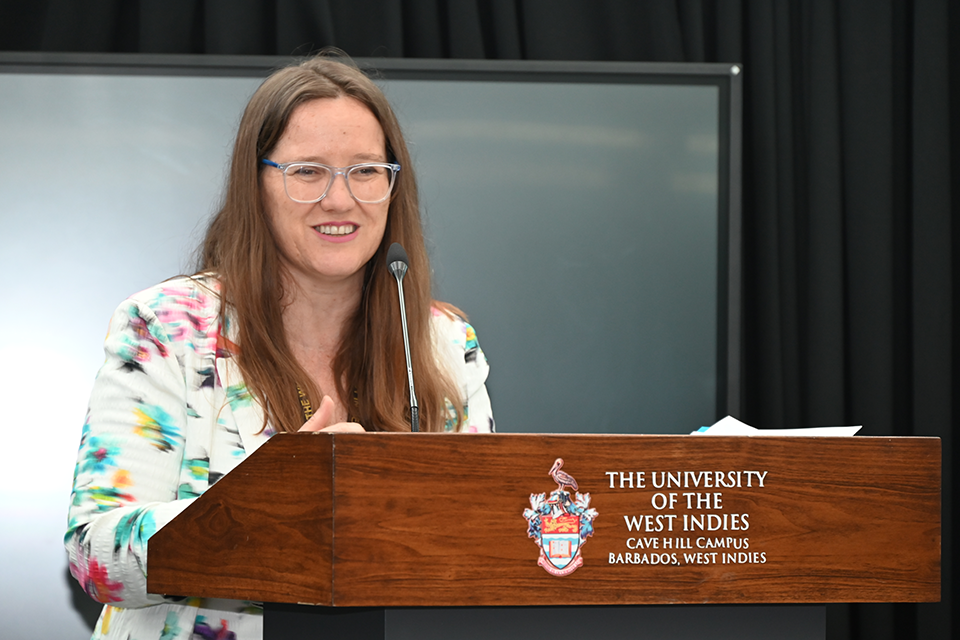
Cecilia Alemany, Deputy Regional Director of UN Women for the Americas and the Caribbean, stated the following regarding this space: "We need to learn from the policies and dynamics of the Caribbean, how they are developing their responses, their narratives, and place them at the center of the regional dialogue with the rest of Latin America. At the continental level, many recent advances and innovations in care systems and policies have occurred. In the Caribbean, there have been significant advances in integrating the environmental dimension into all development policies; however, the territorial dimension of care does not yet occupy a central role in these responses.
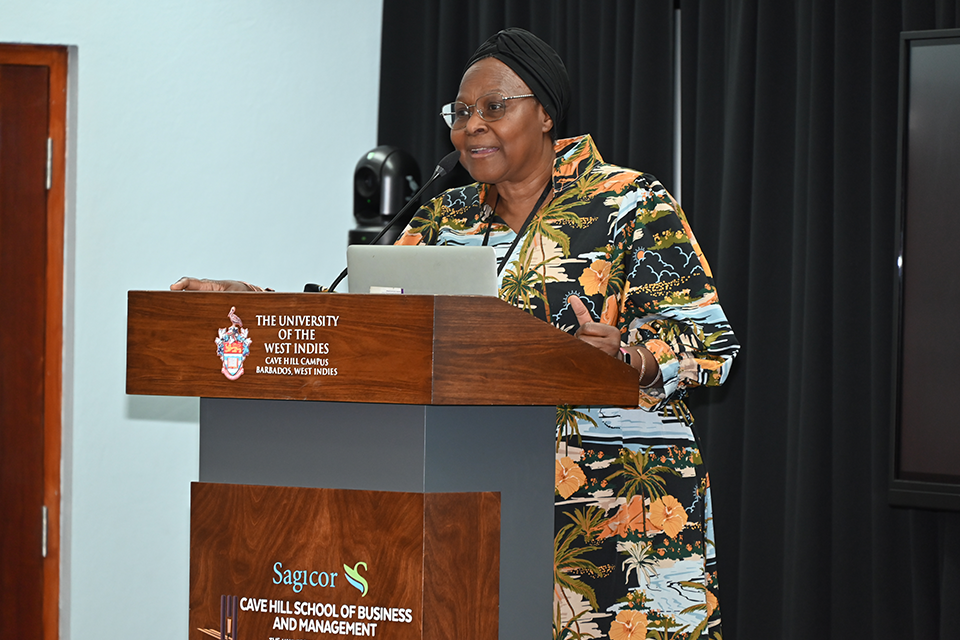
Caribbean territories have been reflecting on and developing practices focused on territorial resilience, agroecology, and sustainability from a strong community perspective for years. In this context, the notion of care is intertwined with that of memory, identity, and the lingering wounds of colonialism. As expressed by Mariama Williams, a consultant at the Integrated Policy Research Institute (Caribbean), "We would not have survived slavery and colonialism without taking care of each other," noting that care has been a survival strategy for indigenous and Afro-descendant peoples. Williams also warned about the risks of maladaptation and called for an understanding of territory not only in its geographic dimension but also in its social and symbolic dimensions.
The concept of maladaptation was very present in the two-day debate, as a key risk to those strategies or policies designed to address climate change that, instead of reducing vulnerability, aggravate it or create new forms of inequality. From a gender perspective, this occurs when, for example, climate solutions are implemented without considering the care burdens already disproportionately borne by women, which can intensify their time poverty, limit their economic or political participation, or increase their exposure to risks. Williams noted, "Climate change in the Caribbean is not just an environmental phenomenon. It is a lived crisis in bodies, economies, and care systems. If we don't understand it this way, we will continue to generate exclusionary responses."
A concrete example could be the promotion of certain agricultural or environmental conservation practices that, without support or redistribution of tasks, fall on already overburdened rural women. Or community resilience programs that rely on unpaid volunteerism, often supported by women.
In the words of Carolina Robino, senior program specialist at the International Development Research Centre of Canada (IDRC-IDRC), "If care is central to climate resilience, it must be recognized, accounted for, and compensated." Ignoring this dimension can turn even well-intentioned policies into forms of maladaptation that perpetuate or deepen gender inequalities.
In the Caribbean, care is built from this complexity, with the need for its own narratives that recognize its history and simultaneously build bridges with the rest of Latin America. To speak of new narratives implies approaching the population from their realities, reconstructing the very concept of territory, and redefining care as a collective value rooted in diverse identities and often traversed by the legacy of colonialism.
In this territory, this re-signification is essential to advance toward a cultural transformation, identified at the Forum as one of the main challenges for designing inclusive and effective public policies. Transforming the care culture is not only a technical or economic issue: it requires reconfiguring imaginaries, recognizing the contributions of the care economy as part of the productive fabric, and actively involving men in the responsibilities of care. This narrative construction must be based on listening to and recognizing the historical, racial, territorial, and gender realities that have shaped the daily lives of communities. Only from there is it possible to promote transformative policies that do not reproduce inequalities but rather pave the way for a care society rooted in social justice and recognition of the knowledge and experiences that have sustained life, often on the margins.
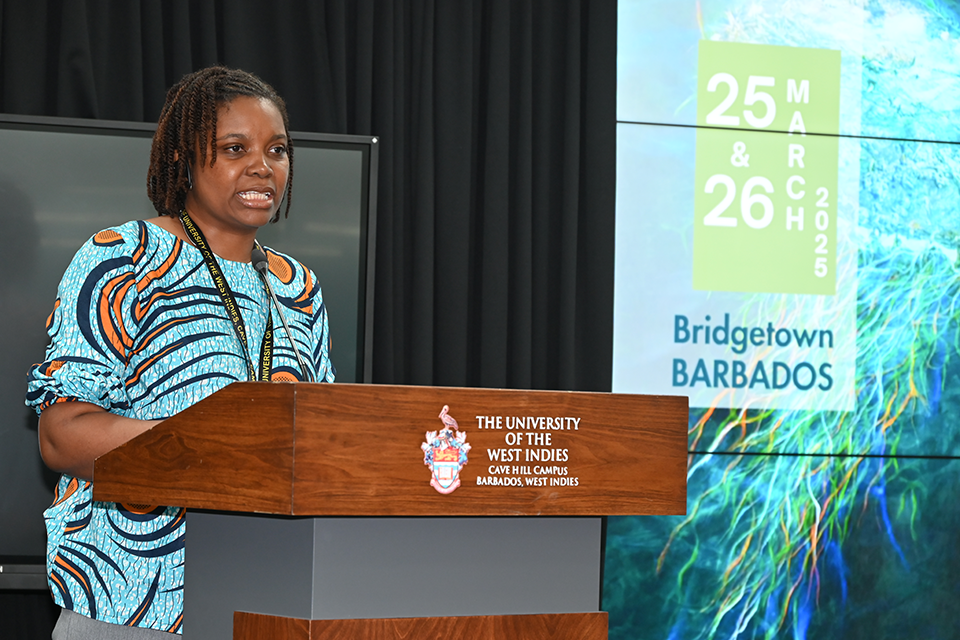
On this territory, Isiuwa Iyahen, Deputy Representative and Head of Office a.i. of UN Women in the Caribbean: "In any sector, the lack of a gender perspective limits the impact of public policies. The Caribbean needs answers that recognize and value care from our reality."
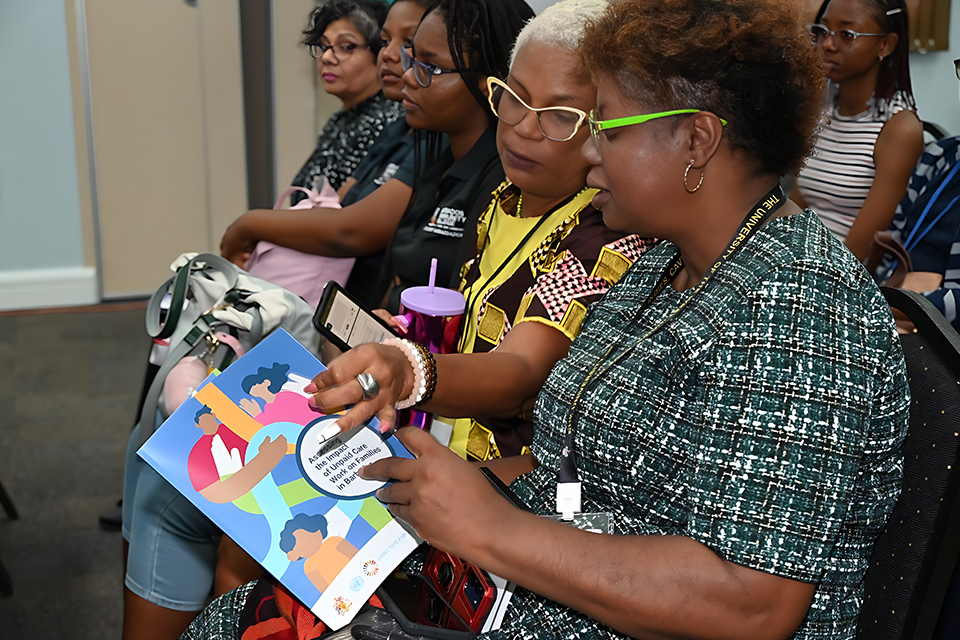
Another issue addressed at the Forum was health, which is understood from an integral perspective and is deeply linked to the right to care. The importance of including mental health as a critical dimension was stressed, especially in contexts of climate disasters, forced displacement, and human mobility, which are increasingly frequent phenomena in the Caribbean region. The participants shared research and experiences demonstrating how women, in their role as caregivers, face greater impacts on their physical and emotional health, which are often overlooked or made invisible by public policies. The need to advance intersectional approaches to health that recognize the interaction between gender, class, ethnicity, territory, and climatic conditions and place women's health at the center of strategies for resilience and sustainable development was emphasized.
The Forum also addressed decent work, care as work, and labor rights and migration dynamics as fundamental dimensions for understanding and transforming the social organization of care in the region, with the online participation of the Regional Director of the International Labor Organization (ILO), Ana Virginia Moreira.
Emphasis was placed on the situation of domestic and care workers, many of whom are migrants, who face precarious working conditions, lack of social protection and recognition, and legal and cultural barriers that deepen their vulnerability. In a Caribbean crossed by internal and cross-border migratory flows, human mobility directly impacts care networks, both in communities of origin and destination. The participants agreed on the urgency of promoting labor policies that recognize the value of care work and guarantee rights for those who perform it, as well as regulatory frameworks that address migration from a human rights, gender, and intersectionality approach.
The participation of Ida Le Blanc, General Secretary of the National Union of Domestic Workers (NUDE) of Trinidad and Tobago, highlighted the significant gaps that persist in the recognition of labor rights in the care sector. They denounced conditions of high informality, the absence of social security, the lack of maternity leave, and the legal exclusion that prevents them from being recognized as workers entitled to their rights. Their testimony demonstrated that there is still a long way to go to guarantee respect, dignity, and labor protection for those who sustain life daily. They also stressed the urgent need to strengthen union organizations in the sector to advance towards labor justice and full recognition of care work.
During the forum, Colin Jordan, the Minister of Labor, Social Security, and the Third Sector of Barbados, emphasized the need to advance the professionalization of care occupations, particularly in the education and nursing sectors. He noted that strengthening training, working conditions, and professional recognition for those who perform these traditionally feminized and undervalued jobs is crucial to building a care society. He also emphasized the importance of guaranteeing the rights of people with disabilities, including their access to decent care, adequate services, and public policies that promote autonomy and early detection.
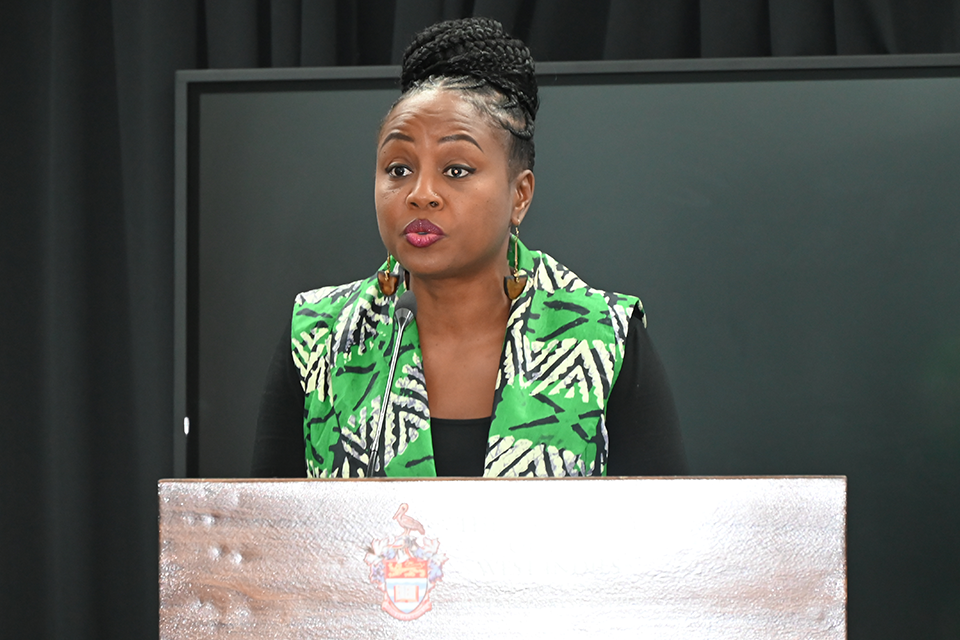
Conclusions of the Forum: care as a transformative act
The closing of the Forum was marked by a strong call to recognize care as a profoundly transformative act, not only relational but also structural. Miriam Moïse, Associate Professor of English and Gender Studies at the Université des Antilles (Martinique), and Tonya Haynes, Director of the Institute of Gender and Development Studies, Nita Barrow Unit, University of the West Indies, Cave Hill Campus, stressed that care is neither a private responsibility nor an act of charity, but a human right and a basis for social justice, resilience, and sustainability. They stressed the need to rethink power, redistribute care responsibilities, and strengthen regulatory frameworks, public policies, and State investment.
Tonya Haynes stressed: "The Barbados Forum comes to an end and encourages us to recognize that building caring societies is about impacting inequality, reclaiming what has been made invisible and putting human beings at the center of our systems and structures. It is to reimagine power itself and respond to the crisis, not with austerity, but with solidarity".
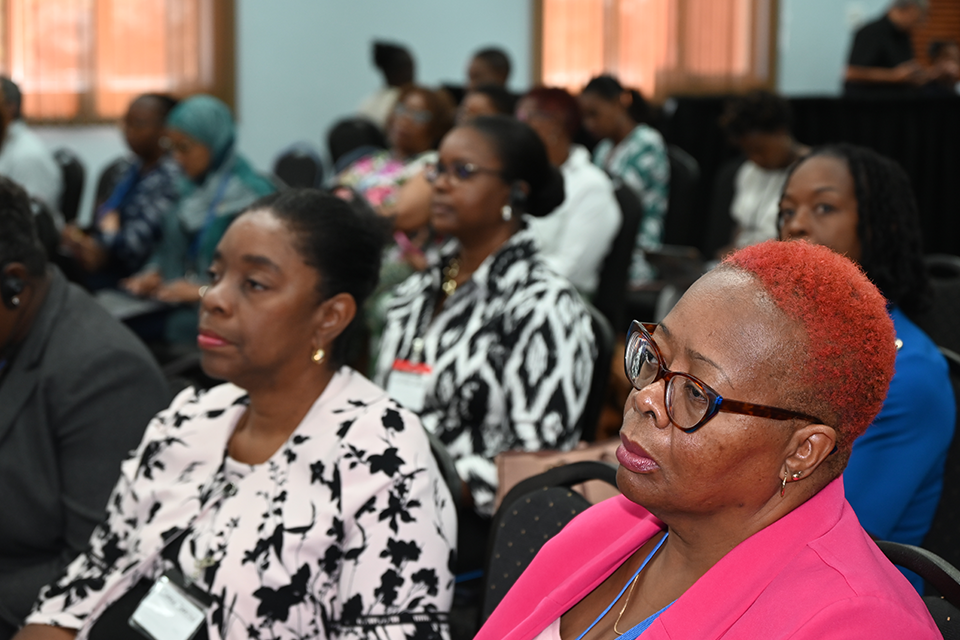
It was reaffirmed that the Caribbean brings a unique vision deeply rooted in history, identity, resilience, and community knowledge. From this perspective, advancing care policies and systems is inseparable from other urgent priorities, such as decent work, climate justice, rights linked to human mobility, health, education, and social protection.
Finally, several concrete next steps were announced: a regional report of academic and public policy contributions, a publication on care and climate with voices from the Caribbean and Latin America, and the creation of a regional research and policy network on care and gender equality. The call was clear: to shake the future, as the poet Dorothea Smartt put it, and collectively build the care societies that the region needs - not only as a possibility but as an urgent matter.